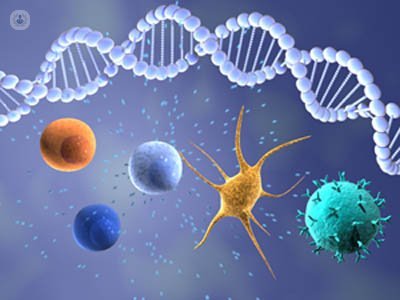Advances in Immunotherapy
Written by:Our defense system (immune system) is composed of cells, cell receptors, intracellular proteins, and soluble factors various immune functions. This diversity of components explains why there are multiple pathologies that can affect it , and so are the forms of modulation system, what we call Immunotherapy globally.
The scope of Immunotherapy ranges from preventive vaccines of all life, including therapeutic vaccines for viral and bacterial infections, to more recent immunotherapy protocols applicable cancer against check-points or checkpoints immune system.
Autoimmune diseases
There has been a breakthrough in immunotherapy of systemic inflammation and autoimmune diseases such as rheumatoid arthritis, inflammatory bowel diseases or organ specific diseases such as autoimmune diabetes. This is mostly of monoclonal antibodies against various targets that have made a significant improvement in the arsenal of therapies available to treat these diseases. In addition, biomarkers are emerging (eg. antibody levels in blood) that allow you to enter the letter these biological therapies and some genetic markers that may be useful to locate the best candidates to respond to them.

transplants
In transplantation immunotherapy agents are used to prevent and treat graft rejection, and also to control severe infections.
Furthermore, it has been considerable progress in the evaluation of cell therapy tolerogenic. Are evaluating new forms of immunotherapy based on dendritic cells, regulatory T cells or regulatory B cells to the transplanted patient can maintain engraftment without using immunosuppressants.
In the field of prevention and treatment of serious infections in transplants being evaluated the role of non - specific intravenous and subcutaneous immunoglobulins, but also specific immunoglobulins against cytomegalovirus, chickenpox and hepatitis B. It has also been evaluated adoptive immunotherapy based on T cells to control viral infections where cytomegalovirus is an important target.
Cancer immunotherapy
One of the most recent developments is the inhibition of immune checkpoints (points of immune control) to enhance the anti - tumor immune activity in certain cancers.
The immune system has complex control mechanisms used to avoid exaggerated responses that we can cause harm. Tumor cells can use these control mechanisms to avoid it.
New cancer immunotherapy agents include antibodies, peptides, proteins, cytokines or cells that can facilitate, enhance or reschedule the action of the innate and / or adaptive immune system against tumor. One of the challenges will be to achieve an appropriate modulation of the immune mechanisms, demonstrating ultimately therapeutic benefit with minimal risk.
allergic diseases
 Other applications are in the immunotherapy of allergic diseases field. In addition to getting better designed vaccines have emerged monoclonal antibodies useful for controlling complex cases of asthma, such as anti-IgE monoclonal antibodies.
Other applications are in the immunotherapy of allergic diseases field. In addition to getting better designed vaccines have emerged monoclonal antibodies useful for controlling complex cases of asthma, such as anti-IgE monoclonal antibodies.
Infectious diseases
Hyperimmune globulins are being evaluated for the treatment of influenza A and has been proposed role similar products for the treatment of patients with Ebola. Also, the field will be explored in emerging infections like virus associated Zika. They have also proven preventive and therapeutic to try to control AIDS vaccines.
Control frequent infections (such as caused by bacteria) being rescued concept bacterial vaccines. It is rediscovering the great potential of mucous as areas of application of these vaccines. The use of preparations suitable for the right way can be a powerful tool for better infection control tool.
abortion
Immunotherapy has also been introduced in other fields, such as human reproduction. In the case of recurrent abortion, which may be related to immunological disorders such as lymphocyte activation, cytotoxicity of natural killer cells or changes in the repertoire of receptors of these cells. Different immunotherapies are being evaluated to increase the rate of live births in these patients, including intravenous immunoglobulins.
They have also been evaluated intravenous immunoglobulins in women with obstetric antiphospholipid syndrome, in cases where a new abortion despite the use of conventional therapy consisting of heparin and ASA at low doses occurs.
Security
Proper immune monitoring of target components of the various forms of immunotherapy and the possible consequences thereof with regard to patient safety is also a focus of attention in many teams are focusing their research efforts in immunotherapy. We must remember that these therapies may cause adverse events in some patients so that one of the objectives of the immunologist is the identification of patients at risk of these adverse events.
In short, there are major advances in the field of Immunotherapy for control of diseases, thanks to progress in the knowledge of this complex system, and how safely modulate when necessary.


